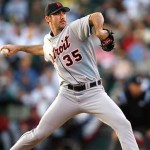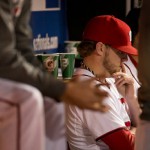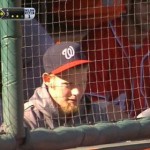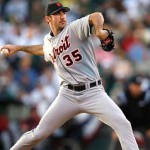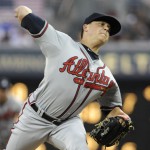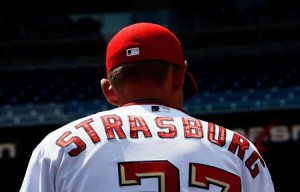Nats 2013 rotation: Strasburg, Gonzalez, Zimmermann, Haren, Detwiler.
Question: Is this the best rotation in the majors? David Schoenfield already thinks so. If not, which team’s would you put up against it?
Last year, this same rotation (with Haren being replaced by Edwin Jackson) was considered a very good rotation, but not amongst the MLB’s elite. That’s mostly because most baseball people thought Gonzalez would regress leaving the comfy confines of Oakland. Instead, Gonzales put up a 21 win season, finished 3rd in the Cy Young voting and stunned most pundits with his lowered walk rates. Meanwhile Zimmermann was getting some minor Cy Young consideration mid-way through the 2012 season before tiring in September; in any case the league-wide recognition for our quiet #3 hurler has been welcome. Strasburg is who he is; inarguably near the top of anyone’s list of the best pitchers in the league.
Now in 2013, with these established guys continuing to improve, with Strasburg unleashed, and with an established #2 Haren in the fold, is this the best rotation in the majors? Here’s your competition for “Best rotation” teams (I’ve got these ranked in my rough order of strength):
- St. Louis: Carpenter, Wainwright, Westbrook, and two from Garcia/Lynn/Kelly/Rosenthal
- Cincinnati: Cueto, Latos, Bailey, Arroyo and Leake
- Atlanta: Hudson, Medlen, Minor, Maholm, and one from Beachy/Delgado/Tehran
- Tampa Bay: Price, Hellickson, Moore, Niemann and one from Cobb/Archer
- San Francisco: Cain, Bumgarner, Lincecum, Vogelsong, Zito
- Philadelphia: Halladay, Hamels, Lee, Kendrick, Worley
- Texas: Darvish, Harrison, Holland, Lewis and probably Ogando barring a FA pickup
- Detroit: Verlander, Fister, Scherzer, Porcello, Smyly
- Oakland: Anderson, Griffen, Parker, Milone and one from Straily/Blackley/Ross/Godfrey
- Los Angeles Dodgers: Kershaw, Beckett, Capuano, Harang and a slew of injuries and question marks.
- Toronto: Johnson, Buehrle, Morrow, Romero and one from Happ/Laffey/Drabeck/Huchinson/someone
Am I missing anyone? Here’s some thoughts on these rotations as they stand right now:
- St Louis‘s rotation was rich enough this year to drop 18-game winner Lance Lynn to the bullpen. With Chris Carpenter healthy in 2013, with Adam Wainwright recovered from Tommy John, and with the likes of hard-throwing Joe Kelly or Trevor Rosenthal as your #5 starter, this is a scary rotation.
- Cincinnati’s 5 starters took every 2012 start except ONE (the back half of an August double header). In today’s baseball landscape, that’s nothing short of amazing. Mike Leake may not be the strongest #5, but Cincy’s 1-2-3 put up great numbers pitching in a bandbox in Cincinnati.
- Atlanta‘s found gold in Kris Medlen gives Atlanta enough depth to trade away starters (the Tommy Hanson for Jordan Walden deal). They have 4 excellent starters and then can pick from 3 top-end prospects for the 5th starter until Brandon Beachy is back from surgery.
- Tampa Bay has well-known pitching depth, and even with the anticipated move of James Shields they have depth up and down the rotation. Expect a bounce-back sophomore campaign from Matt Moore and more excellent innings from rising hurlers Alex Cobb and Chris Archer. They may not be the best, but they’re certainly the most value for the dollar.
- San Francisco has won two World Series’ in three years with the same core of hurlers, and there’s no reason to think they won’t continue to be amongst the elite in the league. The question remains though; what are thet getting from Tim Lincecum in 2013? And, can Barry Zito continue his career rebound? If the answers are yes and yes, then this rotation is much closer to the top of the list.
- Philadelphia‘s big 3 are all fantastic, but are showing signs of age. Roy Halladay only had an 89 ERA+ last year; has age caught up to him? The drop-off after the big 3 is significant too.
- Texas bought an ace last off-season in Yu Darvish, has a couple of good arms developed in house in Holland and Harrison, but has been depending on one-off FAs to fill the void. They need a full healthy year out of their two upper-end arms Alexi Ogando and/or Neftali Feliz to make the leap. Felix is out for most of 2013 though after getting Tommy John surgery in August. If they buy a FA this off-season, this rotation works its way further up. Especially if that FA is Zack Greinke.
- Detroit‘s rotation in the post season was fantastic against New York, then god-awful against San Francisco. Why? What can they change in 2013? They lose Anibel Sanchez to free agency, but their top three arms in Verlander, Fister and Scherzer are just as good as anyone elses 1-2-3 in terms of cumulative depth. If they retain Sanchez, this rotation rises in the rankings as well.
- Oakland‘s slew of young, cost contained and quality starters is the envy of the league. The only thing that keeps this list from greater acclaim is Oakland’s relative lack of recent success. Throw in a couple more playoff appearances and Billy Beane can get a sequel to Moneyball published.
- Los Angeles has an Ace in Clayton Kershaw, a possible near-ace career reclamation project in Josh Beckett, and then a bunch of question marks. Two rotation stalwarts Ted Lilly and Chad Billingsley remain injury question marks for 2013, and the rest of their rotation right now are league average hurlers. If they make a splash in the FA market (Greinke?) this rotation could rise in the ranks as well.
- Toronto: Its not every day you can trade for 4 starting players, including two rotation members. But thanks to Miami’s salary dump, Toronto finds itself with a significantly improved rotation. Is it close to league best? No, probably not. But if Josh Johnson returns to Ace form, coupled with Brandon Morrow‘s fantastic 2012 performance and Mark Buehrle‘s solid #3 stuff, they have something to build on.
Where would I put Washington’s rotation in this list? At the top, or very close to it. Each of our guys matches up well in a head-to-head competition going down the line, with Haren as a #4 starter that you’d likely take 100% of the time over anyone else’s #4 starter.
